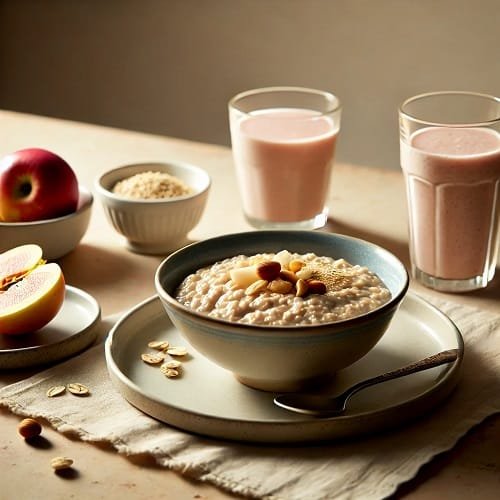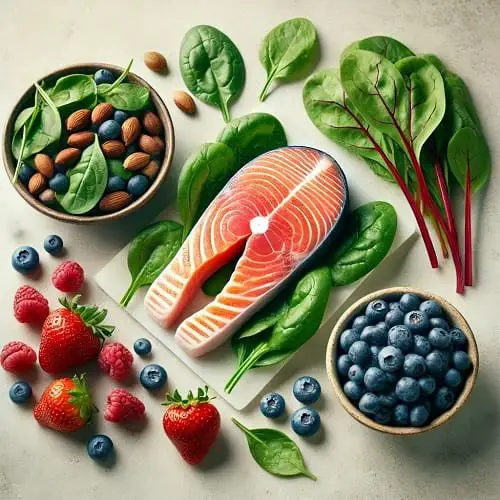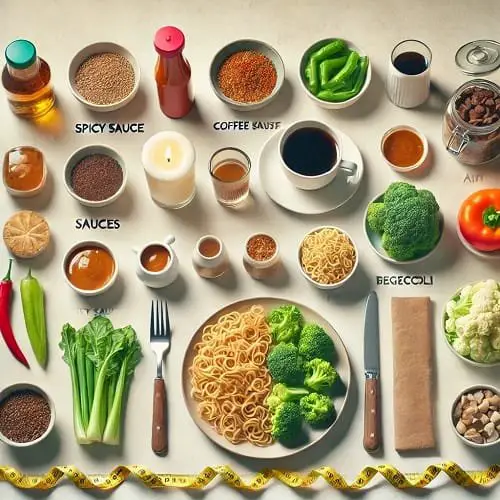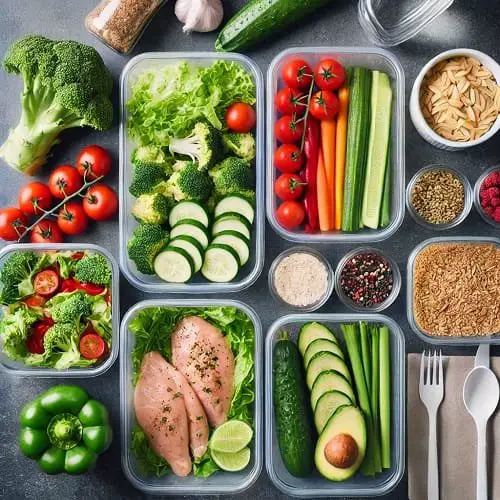Introduction
Living with ulcerative colitis can be challenging, especially when it comes to eating in a way that supports your gut health and reduces symptoms. This inflammatory bowel disease can make certain foods hard to digest, and flare-ups can occur if your diet isn’t managed carefully. However, with a targeted, soothing diet plan, you can take control of your symptoms and feel better day by day.
Designed with digestive ease in mind, this 7-day meal plan supports those with ulcerative colitis. Each meal includes anti-inflammatory and nutrient-rich ingredients to help reduce discomfort and manage inflammation. Follow along to discover delicious and gut-friendly recipes that nourish your body and provide comfort. With each day, you’ll have guidance on what to eat to ease symptoms and support your digestive health.
Table of Contents
- Introduction
- Day-by-Day Meal Plan
- Key Nutrients for Ulcerative Colitis
- Foods to Avoid with Ulcerative Colitis
- How to Prepare for the 7-Day Meal Plan
- Benefits of a Tailored Diet for Ulcerative Colitis
- The Power of a Gut-Friendly Diet for Ulcerative Colitis
- Frequently Asked Questions (FAQ)
- Conclusion
Day-by-Day Meal Plan

In this 7-day meal plan for ulcerative colitis, we’ve carefully selected foods that are gentle on the stomach, nutritious, and delicious. Each day includes options for breakfast, lunch, dinner, and snacks to keep you satisfied and energized.
Day 1: Gentle Start to Soothe Symptoms
- Breakfast: Start your day with a smoothie for ulcerative colitis made from bananas, almond milk, and a spoonful of almond butter. This easy-to-digest smoothie is rich in potassium and healthy fats, which help reduce inflammation.
- Lunch: Try a comforting chicken and rice soup that aligns with a low-residue diet for digestive wellness. The tender chicken and rice are mild and filling, providing a good source of protein without irritating the gut.
- Dinner: Have a simple baked salmon with steamed carrots and zucchini. These anti-inflammatory foods for ulcerative colitis provide omega-3 fatty acids and essential nutrients for healing.
- Snack: A banana with a small scoop of almond butter is a perfect snack that’s gentle on the digestive system.
Day 2: Adding Nutrients for Gut Health
- Breakfast: Oatmeal topped with mashed berries and a drizzle of honey. This ulcerative colitis-friendly recipe is easy to digest and provides a gentle source of fiber.
- Lunch: A spinach and sweet potato salad with a light drizzle of olive oil. Sweet potatoes are foods that soothe ulcerative colitis symptoms due to their anti-inflammatory properties.
- Dinner: Lightly grilled chicken breast with mashed potatoes. This meal is part of a balanced meal for sensitive stomachs and provides protein without irritating the gut.
- Snack: Applesauce with a sprinkle of cinnamon. This snack offers a naturally sweet option that’s low-residue and easy on digestion.
Day 3: Emphasizing Easy-to-Digest Foods
- Breakfast: Blend almond milk, blueberries, and a scoop of chia seeds for a refreshing smoothie. This smoothie for ulcerative colitis is rich in antioxidants and easy to digest.
- Lunch: Low-fiber vegetable soup made from carrots, zucchini, and potatoes, blended for an easy-to-digest consistency. A staple choice in the ulcerative colitis flare-up diet, this soup offers soothing support.
- Dinner: Baked cod with steamed green beans and rice. This colitis diet recommendation provides essential protein and is easy on the stomach.
- Snack: Yogurt with a small spoonful of honey. Choose a low-sugar, dairy-free yogurt if possible, as it’s gentle on the digestive system and provides probiotics.
ALSO READ
Cereal Milk Strain: Everything You Need to Know About This Unique Cannabis Strain
Is Vitamin Water Good for You? Discover the Facts, Benefits, and Drawbacks
Unlock Vibrancy: Honey Citrus Mint Tea Recipe and Its Powerful Benefits
The Incredible Health Benefits of Drinking Honey and Apple Cider Vinegar
Pineapple Cucumber Juice: 5 Powerful Reasons to Supercharge Your Health
Day 4: Anti-Inflammatory Focus
- Breakfast: Overnight oats with almond milk and a mashed banana. This ulcerative colitis diet plan option offers gentle fiber and a natural sweetness.
- Lunch: Turkey and rice bowl with steamed carrots. Turkey offers a high-protein option, fitting well within a low-residue diet that supports digestive health.
- Dinner: Enjoy baked sweet potatoes topped with Greek yogurt and a side of steamed spinach, both nutrient-dense foods for gut health.
- Snack: Sliced cucumber with a light sprinkle of sea salt, a refreshing and gut-friendly ingredient for ulcerative colitis.
Day 5: Building a High-Protein Diet
- Breakfast: Scrambled eggs with a side of mashed avocado. Eggs provide a high-protein ulcerative colitis meal that’s easy to digest.
- Lunch: Soft tofu and vegetable stir-fry with rice. This healthy meal for inflammatory bowel disease provides plant-based protein and essential nutrients.
- Dinner: Grilled chicken with roasted butternut squash and a side of rice. This dish is part of a colitis diet recommendation for a well-rounded, easy-to-digest meal.
- Snack: Applesauce with a small scoop of almond butter for a satisfying, low-residue snack.
Day 6: Supporting Digestive Health with Balanced Meals
- Breakfast: Smoothie with coconut milk, mango, and a spoonful of chia seeds. This smoothie for ulcerative colitis is both refreshing and nourishing.
- Lunch: A small serving of pasta with olive oil and steamed zucchini. This meal aligns with the ulcerative colitis diet plan and is easy to digest.
- Dinner: Baked tilapia with mashed cauliflower and green beans. This dish is a part of a low-residue diet for digestive health.
- Snack: Yogurt with blueberries. This snack is gentle on digestion and offers probiotics that can support gut health.
Day 7: Reinforcing Nutrient-Rich Choices
- Breakfast: Oatmeal with a light drizzle of honey and soft, cooked apples. This ulcerative colitis-friendly recipe is soothing and nutritious.
- Lunch: Chicken and rice soup, a gut-friendly meal for ulcerative colitis that’s simple and easy on the digestive tract.
- Dinner: Baked sweet potato with grilled salmon and a side of steamed broccoli. Sweet potatoes and salmon are anti-inflammatory foods for ulcerative colitis.
- Snack: Banana with a handful of blueberries for a gentle, nutrient-rich snack.
Key Nutrients for Ulcerative Colitis

A diet for managing ulcerative colitis should focus on certain nutrients that promote healing and reduce inflammation. Some essential components include:
- Omega-3 Fatty Acids: Found in salmon and flaxseeds, these fats help reduce inflammation and are essential in a 7-day meal plan for ulcerative colitis.
- Protein: High-protein meals like chicken and eggs provide essential building blocks for healing.
- Antioxidants: Berries and leafy greens offer antioxidants that combat inflammation.
These nutrients are included in each meal to promote optimal gut health and reduce flare-up risks.
Foods to Avoid with Ulcerative Colitis

To keep symptoms at bay, it’s essential to avoid certain foods. Common triggers include:
- High-Fiber Raw Vegetables: Choose cooked options instead to avoid irritation.
- Processed Foods: These can be hard on digestion and often contain preservatives that may trigger symptoms.
- Caffeinated and Carbonated Drinks: These beverages may worsen symptoms for many people.
This ulcerative colitis diet plan is designed to minimize these triggers and provide relief.
How to Prepare for the 7-Day Meal Plan

To make following this plan easy, here are a few tips:
- Meal Prep: Preparing ingredients in advance can help you stay on track and avoid trigger foods.
- Grocery List: Plan for fresh, anti-inflammatory foods like fish, vegetables, and gentle grains to ensure success.
Benefits of a Tailored Diet for Ulcerative Colitis

A tailored meal plan offers several advantages:
- Reduced Flare-Ups: Sticking to a low-residue, anti-inflammatory diet can help control symptoms.
- Improved Digestive Health: Consistently eating nutrient-rich, easy-to-digest foods supports gut healing.
A personalized diet is a powerful tool for managing ulcerative colitis.
The Power of a Gut-Friendly Diet for Ulcerative Colitis

Incorporating a 7-day meal plan for ulcerative colitis can be a game-changer for managing symptoms and improving daily comfort. By focusing on anti-inflammatory, easy-to-digest foods, this plan offers a foundation for building better eating habits that support gut health long-term. Many people with ulcerative colitis find that carefully selecting foods helps reduce flare-ups, boost energy, and even improve mental well-being.
While adjusting your diet can feel challenging, sticking to a thoughtful meal plan makes it easier to avoid trigger foods and focus on what truly nourishes your body.
A tailored diet doesn’t just alleviate symptoms; it empowers you to take control of your health. Each meal in this 7-day meal plan for ulcerative colitis is crafted with ingredients that reduce inflammation, provide essential nutrients, and are easy on the digestive tract.
Over time, making these dietary changes can lead to a more balanced, symptom-free life and fewer disruptions caused by flare-ups. Remember, your diet is a powerful tool—by prioritizing foods that are gentle on your system, you can enhance your quality of life and enjoy greater confidence in managing ulcerative colitis.
Frequently Asked Questions (FAQ)
- What foods should I avoid if I have ulcerative colitis?
Avoid high-fiber raw veggies, processed foods, and caffeine.
- Can I have fiber in my diet with ulcerative colitis?
Yes, but choose cooked vegetables and low-fiber fruits to avoid irritation.
- How does this meal plan help with flare-ups?
This plan focuses on gentle, anti-inflammatory foods that support healing.
- Is dairy safe for people with ulcerative colitis?
Many people with ulcerative colitis are sensitive to dairy, as it can lead to bloating and discomfort. Try dairy-free options, such as almond milk or coconut yogurt, as part of your meal plan.
- Can I include fiber in my ulcerative colitis diet?
Yes, but it’s best to focus on low-residue or easy-to-digest fibers like cooked vegetables, peeled fruits, and soft grains. Avoid high-fiber raw veggies to reduce irritation.
- Are there any supplements recommended for ulcerative colitis?
Omega-3 supplements, probiotics, and certain vitamins (like vitamin D and B12) may support gut health, but consult with your doctor before starting any new supplements.
- What should I eat during an ulcerative colitis flare-up?
During a flare-up, it’s best to stick to bland, low-residue foods like broths, soups, mashed potatoes, and applesauce. Avoid spicy, fibrous, and processed foods that may aggravate symptoms.
- Is a 7-day meal plan for ulcerative colitis enough to see results?
This meal plan can help you get started and may provide noticeable relief. However, long-term dietary management can further improve symptoms and overall gut health.
- Are gluten-free foods better for ulcerative colitis?
Some people with ulcerative colitis find that gluten-free grains (like rice and quinoa) are easier to digest. If gluten sensitivity is an issue, consider incorporating gluten-free options into your diet.
Conclusion
Following a 7-day meal plan for ulcerative colitis can make a world of difference in managing symptoms and supporting gut health. By choosing the right foods and avoiding common triggers, you’re empowering yourself to feel better and live with more comfort and control.






